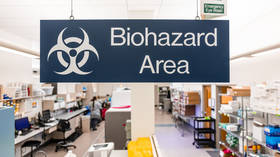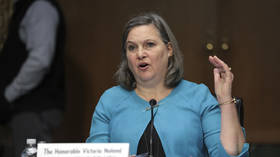Moscow calls for strengthening bioweapons treaty
Mandatory international inspections could keep US labs in check, Russia suggested

An international treaty banning bioweapons needs to be strengthened with a compliance verification mechanism, contrary to the US position on the issue, Moscow said on Wednesday. The call comes in the wake of the reported discovery of evidence that there were lethal pathogens at Pentagon-backed labs in Ukraine.
The Russian military reported this week that Ukrainian authorities had ordered the destruction of highly pathogenic samples that were stored at US-backed biological labs throughout the country.
The purported documents indicate that both Ukraine and the US breached the 1972 Biological Weapons Convention (BWC), which both nations signed and ratified, the Russian foreign ministry alleged on Wednesday. The order to destroy the samples was an attempt to cover up the violations of the treaty, it said.
“We stand for the resumption of the work on a legally binding Protocol to the Convention for an effective verification mechanism, which the US has been stonewalling since 2001,” the ministry said.
The BWC, which came into force in 1975, bans the development, stockpiling and use of biological and toxin weapons. Unlike its counterpart for chemical weapons, the Convention for the Prohibition of Chemical Weapons, the treaty lacks an international watchdog organization to verify compliance.
An attempt to establish such an organization took place in the 1990s. The VEREX ad hoc committee spent a decade formulating proposals for surveillance, inspections, information sharing and other confidence-building measures.
The effort ultimately failed due to objections from the George W Bush administration which, in 2001, rejected a 210-page draft protocol. Washington claimed that it would not have improved the BWC, if implemented, and would have hurt US national security and commercial interests.
John Bolton, then-Undersecretary of State, said at the time that Washington was focusing its anti-germ warfare interest on Iraq. The existence of Saddam Hussein’s bioweapons project was “beyond dispute,” he claimed at the time. Two years later the US invaded Iraq under the pretext that it needed to destroy Iraqi weapons of mass destruction, which was later proven to be false.
Russia has been voicing concerns for years over US military-funded labs hosted by some nations in its proximity, most notably Georgia. Moscow believes that Washington is conducting military research there that may pose a threat to Russia. The foreign ministry statement said activities held on foreign soil should be subjected to reporting under the BWC, just like domestic programs.
The proposed measures “would allow subjecting military-biological activities of the US and its allies … to international control and ensure full verifiable compliance with the BWC by member states,” Moscow said.
Following Russia’s claims about labs in Ukraine, China called on the Pentagon to publicly comment on bio research conducted in foreign nations with its funding. Beijing claimed the US military controlled “336 biological laboratories in 30 countries around the world.”
The US denies that anything nefarious is being done in the labs, claiming they are used to monitor possible emerging infection threats around the world. US Under Secretary of State Victoria Nuland confirmed on Tuesday that her country was involved in Ukraine’s effort to destroy research materials so that Russia would not seize them.
https://www.rt.com/news/551532-bioweapons-convention-verification-mechanism/


0 Comments:
Post a Comment
Subscribe to Post Comments [Atom]
<< Home